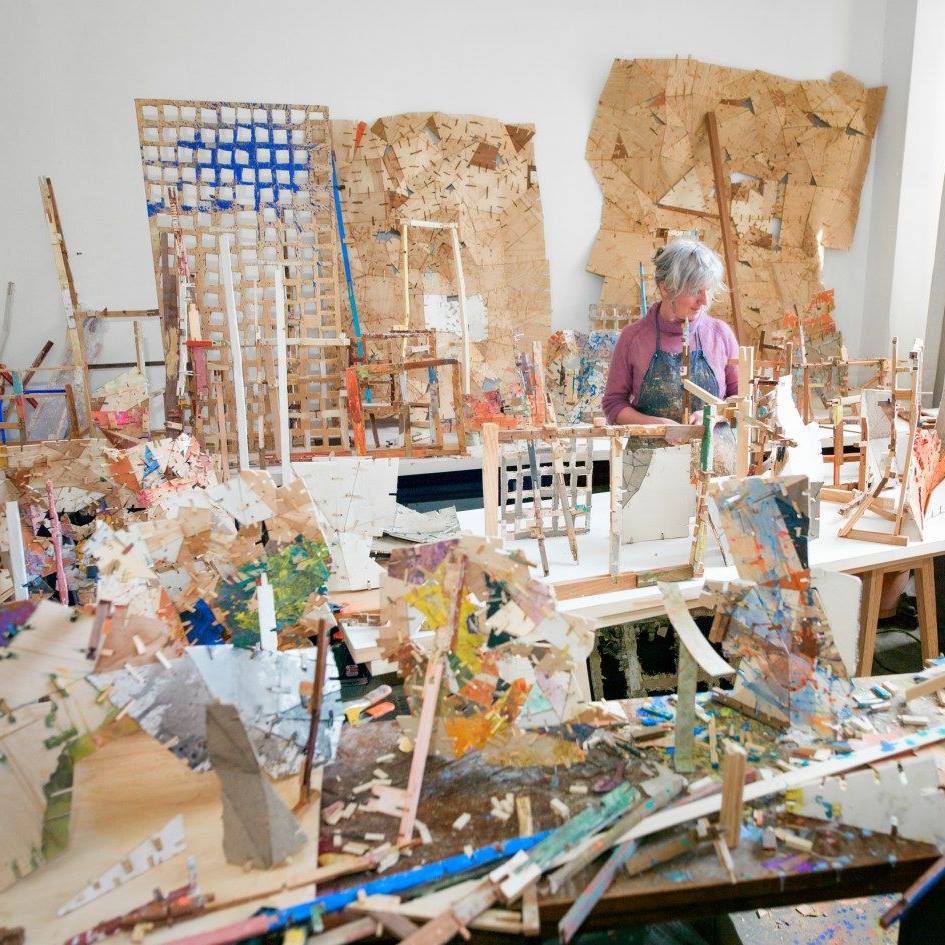Artists on Coping: Helen O’Leary
During the Coronavirus pandemic, Art Spiel is reaching out to artists to learn how they are coping.

Helen O’Leary is an Irish-born artist best known for constructions that blur the boundaries between painting and sculpture, object and image. She trained at the School of the Art Institute of Chicago and the National College of Art and Design, Dublin, Ireland. Her work has been exhibited internationally, including shows at the Irish Museum of Modern Art, Dublin, the American Academy of Arts and Letters, NYC, The MAC, Belfast, NI and SFMOMA, San Francisco, and been recognized by the John S. Guggenheim Foundation, the American Academy in Rome, Rome Prize, the Pollock-Krasner and Joan Mitchell foundations.

AS: How are you coping?
HO: It’s hard to remember a time before lockdown; days seem endless, without their usual bookends. The first week was marked by indecision–whether we should stay in place in Jersey City or go live in the barn in Pennsylvania. My daughter Eva lives in State College, so it seemed the logical destination. With a six-hour flight, returning to Ireland was too dangerous, but I worry for my sisters, and wish I were close by.
I have dear friends in Italy, so was very aware of the magnitude of the virus early on. In late February, I canceled my visit to Florence and grew cautious about attending art openings in New York. The Armory marked a strange beginning; I left thinking attending it had been a dangerous move. Other flags rose quickly: I wondered about the cleanliness of change in my hand and groceries from my local, crowded bodega. I began to redefine safety–of doorknobs, un-announced visitors–hoping to find equilibrium with the new levels of paranoia about my immediate surroundings.
Last Monday I woke with a clear plan to go back to the barn in Pennsylvania. I wanted to be close to Eva, and near my community at the university. When we pulled up to the barn, I felt relief to be back, to be surrounded by books and my badly neglected garden. I feel lucky to have a bolt-hole that feels very much like home.

AS: Has your routine changed?
HO: Our old world seems at a terrible distance and this new limbo seems endless. I get up early and write to friends, or read, or walk–that much is the same. I gave my dog Agnes to Eva, as I’ve developed asthma around her, and putting any strain on my lungs right now seems unwise.
My partner Dan and I have made the barn more home-like, less of a storage unit. We’ve been figuring out how to re-use things and reconfigure what we have to survive. Last semester I co-taught The Sustainable Studio at Pennsylvania State University with artist Kim Flick. We worked closely with the student farm, harvesting all our color from the dye garden. The hoarder in me collected buckets of seeds to for the development of my own studio roof dye garden (the DIY Museum) in Jersey City. The other day I remembered these seeds, and it was the first time I felt real hope since the crisis began. I raced to the barn to find them and they’ve become a down payment on a better future. I’m sorting them into colors and will prepare the dye and food-beds soon.
I’d been working on a project in Jersey City with Dan that would turn the studio and cobbled-together house into a self-sustainable DIY museum/home and art object. It was hard to hit the pause button, but with both of our health/age issues, it seems safer to work on it remotely. I am planting the dye-garden seeds and will transplant the garden when we return.

AS: Can you describe some of your feelings about this?
HO: It’s reawakened every insecurity, doubt and vulnerability I’ve ever known. Like my childhood when all systems failed, and we were suddenly bankrupt in a sea of endless fear, loss, poverty and grief. Part of me is reliving it while the other part is doing what survivors do: pushing ahead, going into remote survival mode. I have a good network of friends and we check in with each other, and I try to reach out to people who are isolated, live alone, or are vulnerable.
It’s the first time I’ve felt cut off from my family in Ireland. I feel I can’t go home and am truly in exile. I don’t have words to describe it, and on many levels wish I was there. I think our international lifestyles are over, and we’ll have to choose more carefully where and how we live.

AS: What matters most right now?
HO: People. I get up early, reach out to family and friends, walk around my garden and watch things bud and press up through the earth. I get new joy from listening to my daughters disembodied voice through the phone, and mentally sustained by texts and zoom meetings. I sort seeds for my imagined dye and food garden and think about moving forward. I have some work here; a set of tools, bits of work, and am looking to merge my life /work and community together for sustenance.
AS: Any thoughts about the road ahead?
HO: I can’t imagine a time when we’ll get back to a new normal; small victories are clocked on a day-by-day basis. I think of my garden and my studio, my sisters and nieces in Ireland, my friends, students and colleagues, and the people I’ve come to love on my street in Jersey City, as well as my family of artists around the world. I just want us all to get through intact. As Seamus Heaney said, “If we winter this one out, we can summer anywhere.”


